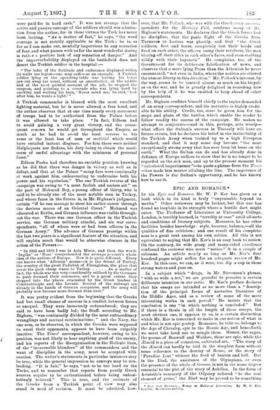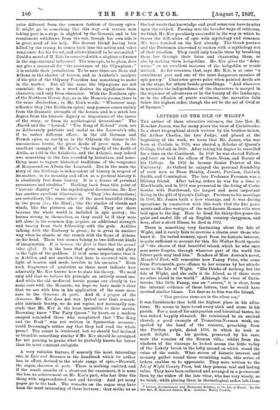EPIC AND ROMANCE.* IN his Epic and Romance Mr. W.
P. Ker has given us a book which in its kind is truly " unpraisable beyond its merits." Other reviewers may be luckier, but this one has found no loophole in its strength where a hostile dart might enter. The Professor of Literature at University College, London, is terribly learned, is "terribly at ease" amid all sorts and conditions of literary subjects. Moreover, he has other facilities besides knowledge: style, humour, balance,—all the qualities of fine criticism; and one result of his complete- ness is a great rout among his own critics. All this is not equivalent to saying that Mr. Kees is an easy book to review. On the contrary, its wide grasp and many-sided excellence confound the reviewer who must "notice" it in a couple of columns. An article nearly as long as Mr. Kees four hundred pages might suffice for an adequate review of Mr. Ker. In this case, we can, as it were, but dip a cup in these strong waters and pass on.
In a subject which "drags, in Mr. Stevenson's phrase, "with so wide a net," we are grateful to perceive a certain deliberate intention in our critic. Mr. Ker's preface declares that his essays are intended as no more than a " descrip- tion of the principal forms of narrative literature of the Middle Ages, and as a review of some of the more interesting works in each period." He insists that the conclusion is one "in which nothing is concluded." But if there is a thesis in all the length of these essays, the most obvious one, it appears to us, is a certain distinction which Mr. Ker is boucenaed to make in our notion of what is and what is not epic poetry. Romance, he tells us, belongs to the Age of Chivalry, epic to the Heroic Age, and henceforth we must take heed not to mingle them. Homer, the sagas, the poems of Beowulf and Waldere, these are epic, while the .ZEneid is a piece of conscious, cultivated art. "The story of the .2Eneid can hardly be told in the simplest form without some reference to the destiny of Rome, or the story of 'Paradise Lost' without the feud of heaven and hell. But in the Iliad, the assistance of the Olympians, or even the presence of the whole of Greece, is not in the same degree essential to the plot of the story of Achilles. In the form of Aristotle's summary of the Odyssey reduced "to the cool element of prose," the Iliad may be proved to be something
• Epic and Romance: irssays es Iftelizeal Literature. By W. P. Ker. London : fethcmillan and Ca. quite different from the common fashion of literary epics. It might go in something like this way :—A certain man taking part in a siege is slighted by the General, and in his resentment withdraws from the war, though his own side is in great need of his help. His dearest friend having been killed by the enemy, he comes back into the action and takes vengeance for his friend, and allows himself to be reconciled." Could a novel of H. Zola be conceived with a slighter reference to the supernatural influence? The true epic, to be plain, does not give a maravedi for "the assistance of the Olympians ; " it is outside their jurisdiction. To be sure there are Hera and Athena, in the chariot of heaven, and in Aristotle's analysis of the plot of the Odyssey Poseidon has something to make in the matter. But all the same the Olympians are not essential; the epic in a word derives its significance from character, and only from character. With the Northern epic of the Northern Heroic Age, as in the Homeric poems, there is the same distinction ; in Mr. Ker's words "Whatever mag- nificence they [the Northern epics] may possess comes mainly from the dramatic strength of the heroes, and in a much less degree from the historic dignity or importance of the issues of the story, or from its mythological decorations." The 2Eneid and the " Lusiad," "The Song of Roland" even, are as deliberately patriotic and useful as the Laureate's ode, if to rather different effect; in the ' old German and French epics, as surely as in the Odyssey, the theme is the unconscious heroic, the great deeds of great men. In an excellent example of Mr. Ker's, "the tragedy of the death of Attila, as told in the Atlakvi6a and the Atla.mtil, may indeed owe something to the fact recorded by historians, and some- thing more to vaguer historical traditions of the vengeance of Rosamund on Alboin the Lombard. -But in the main the story of the Niblungs is independent of history in respect of its matter; in its meaning and effect as a poetical history it is absolutely free from history. It is a drama of personal encounters and rivalries." Harking back from this point of "historic dignity" to the mythological decorations, Mr. Ker has another excellent illustration. "They [the decorations] are subsidiary, like some other of the most beautiful things in the poem [i.e., the Iliad]; like the similes of clouds and winds, like the pictures on the shield. They are there because the whole world is included in epic poetry ; the heroes strong in themselves, as they could be if they were Left alone in the common day, acquire an additional strength and beauty from their fellowship with the gods. Achilles talking with the-Embassy is great ; he is great in another way when he stands at the trench with the flame of Athena on his head. These two scenes belong to two different kinds of imagination. It is because the first is there that the second lakes effect. It is the hero that gives meaning and glory ;o the light of the goddess. It is of some importance that it is Achilles, and not another, that here is crowned with the light of heaven and made terrible to his enemies." Even such fragments of quotation as these must indicate how admirably Mr. Ker knows how to state his theory. We need only add that we believe his principle an entirely sound one. And while the old mediteval heroic poems are clearly in the same case with the Homeric, we hope we have made it clear that we are with him in his application of the same mea- sure to the chansons de geste. And if, a propos of the chansons, Mr. Ker does not wax lyrical over their remark- able intrinsic beauty, we do not repine, nor necessarily con- clude that Mr. Ker is the least insensible to their merits. Browning knew "The Fairy Queen" by heart, as a modern essayist reminded those who complained that "The Ring and the Book" was not written in Spenserian measure ; could Browning's critics say that they had read the whole poem ? The retort is irrelevant, but we should feel inclined to brandish something similar if Mr. Ker should be arraigned for not pausing to praise what he probably knows far better than its most constant eulogists.
A very valuable feature, if scarcely the most interesting one, in Epic and Romance is the handbook which its author has, in effect, devised to the whole range of epic,—Beowulf, the sagas, chansons de geste. There is nothing omitted, and if the result smacks of a short-cut for examiners, it is none the less an achievement on Mr. Ker's part, who has done the thing with unprecedented tact and brevity. And yet many pages go to the task. The remarks on the sagas may have been the most interesting of these lectures ; they strike us as the last words that knowledge and good sense can have to utter upon the subject. Passing into the broader ways of criticism, we think Mr. Ker peculiarly successful in the way in which he traces the difficulties of epic with mythology and romance. We have touched on the first already. The Greek poets— and the Norsemen also—had to reckon with a mythology not of their creation. They could only handle them by breathing them low through their lutes and chastening them, or else by making them hobgoblins. Mr. Ker gives the " doka- senna " as an excellent instance of the hobgoblin or ironic method. As for romance, that, says Mr. Ker, is at once "a constituent part and one of the most dangerous enemies of epic poetry." Character grows paler when painted devils are on the stage, for others beside groundlings. "And wherever in narrative the independence of the characters is merged in the sequence of adventures or in the beauty of the landscape, or in the effusion of poetic sentiment, the narrative falls below the highest order, though the art be the art of Ovid or of Spenser."



































 Previous page
Previous page